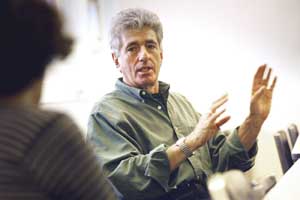2002 Quantrell Award Winner: John Comaroff, Harold H. Swift Distinguished Service Professor in Anthropology and the College
By Josh SchonwaldNews Office
 John Comaroff |
“What the term captures is the attempt to make students look at their world critically and make strange what they take to be familiar, all the better to understand it anew,” said Comaroff.
Specifically, Comaroff wants his students––most of whom come from an American or Western background––to look at their world critically from an Africanist perspective. In challenging them to look at the world through African eyes, Comaroff hopes students will not only develop fresh insights into their own world, but also develop a sense of “Africanity.”
“A sense of ‘Africanity’ implies a profound respect for the aesthetic, cultural, social and political aspects of Africa,” said Comaroff, who has taught in the African Civilization Core for more than 25 years. He has most often taught the first section of the course on Politics, Law and Society in Precolonial and Colonial Africa. In his own research, which has focused primarily on the Tswana peoples of southern Africa, he has studied the politics, law and the history of consciousness.
To encourage students to “think creatively about Africa,” said Comaroff, “you have to use imaginative, pedagogic techniques to de-center them, thereby to challenge their assumptions.”
Tools to “critically estrange” established knowledge include counter-intuitive narratives about, and analyses of African political systems, cultural and social orders, and histories. Comaroff also likes to use what he calls “iconoclastic” lecturing techniques.
In one of his favorite lectures, titled “Why Europe is Evolving Toward Africa,” he discusses how democratic parliamentary systems existed in Africa well before they did in Europe. He also examines African critiques of Western electoral democracy, which is commonly seen to place heavy stress on procedure and relatively little on the real empowerment of citizens. And he talks about how post-modern theory is anticipated in African ideas of selfhood. “Africans have long had an idea of multiple subjectivity,” he said.
Inspiring students at Chicago through his teaching is not all that difficult. “Jean (his wife) and I have probably taught at 80 different universities over the course of our careers,” he said. “Rarely have we encountered students as engaged as our students here.”
If he does observe a student who appears less than engaged, it is particularly fulfilling for Comaroff to see that student’s interest emerge and turn passionate. In 2000, for instance, during the inaugural term of the African Civilization program in Cape Town, South Africa, Comaroff recalled a participant who at first was not terribly interested in the intellectual content of the program. “He was more interested in sports.” But at one point in the term, the student bought a baseball cap with the South African rugby team logo and asked Comaroff: “Does this mean anything?”
“This was what hooked him,” said Comaroff. He and the student started talking at length about the role of rugby, past and present, in South African political history. Through the link between the sport and apartheid, the student developed a deeper interest in South Africa. “He followed his passion.”
“I don’t care if students come to share my views,” said Comaroff. “That’s irrelevant to my teaching. I just want to see them develop intellectual passions, to see their eyes open, their nerve-endings jangle.”
![[Chronicle]](/images/small-header.gif)